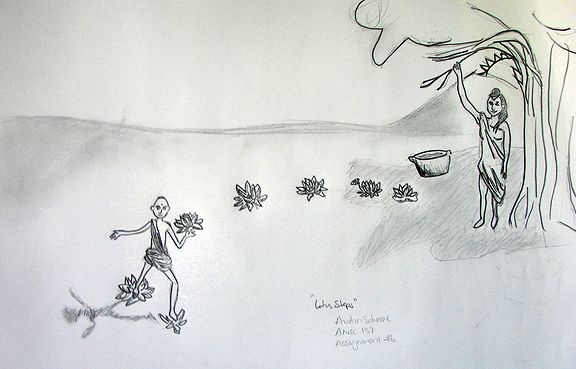
He walked for seven steps, leaving seven lotus prints where he stepped.
Drawing by Austin Scheiwe, Eleanor Roosevelt College (UCSD), Class of 2009, by permission
Not far from Kapilavastu there lived a band of sages practicing religious austerities, and among them was a very elderly one named Asita, who was much respected by all the kingdom, and who had been King Suddhodana’s teacher in the long past. When Asita learned that a prince had been born, he went to the palace. There, seeing that the child was quite out of the ordinary, he both smiled in delight and shed a tear. He explained to the startled King Shuddhodana that the child would someday become a great teacher, but Asita himself would not live long enough to study with him.

When the prince was five days old, King Shuddhodana called in his wise men to give him a felicitous name. They selected Siddhartha (Siddhārtha), which meant something like “Success in all that is done with courage” or “He who achieves his goal.” And, telling his fortune, they predicted that if he should become a king, he would become a great and just king. But should he become an ascetic, he would become a buddha. One younger seer added that when he grew up, Prince Siddhartha was sure to forego the throne, leave his family, experience the Great Enlightenment (mahā-bodhi), and become the world’s greatest religious teacher.
Being the world’s greatest religious teacher sounded good, but in fact all the people hoped that the prince would instead grow up to be a wise king. So, of course, did King Shuddhodana. He certainly did not aspire to have his son leave his family and become a religious teacher. He hoped he would become king, would father children, and would continue the royal line.
Two days after the prince received his name, Queen Maya abruptly took sick and died. And all the kingdom mourned because she was the first among the royal wives.
The prince was put into the keeping of his mother’s sister, also a wife of King Shuddhodana. She was named Maha-prajapati (Mahāprajāpatī), and she raised the boy as she would her own son. And this is how it came to be that Prince Siddhartha never knew his own mother’s face.